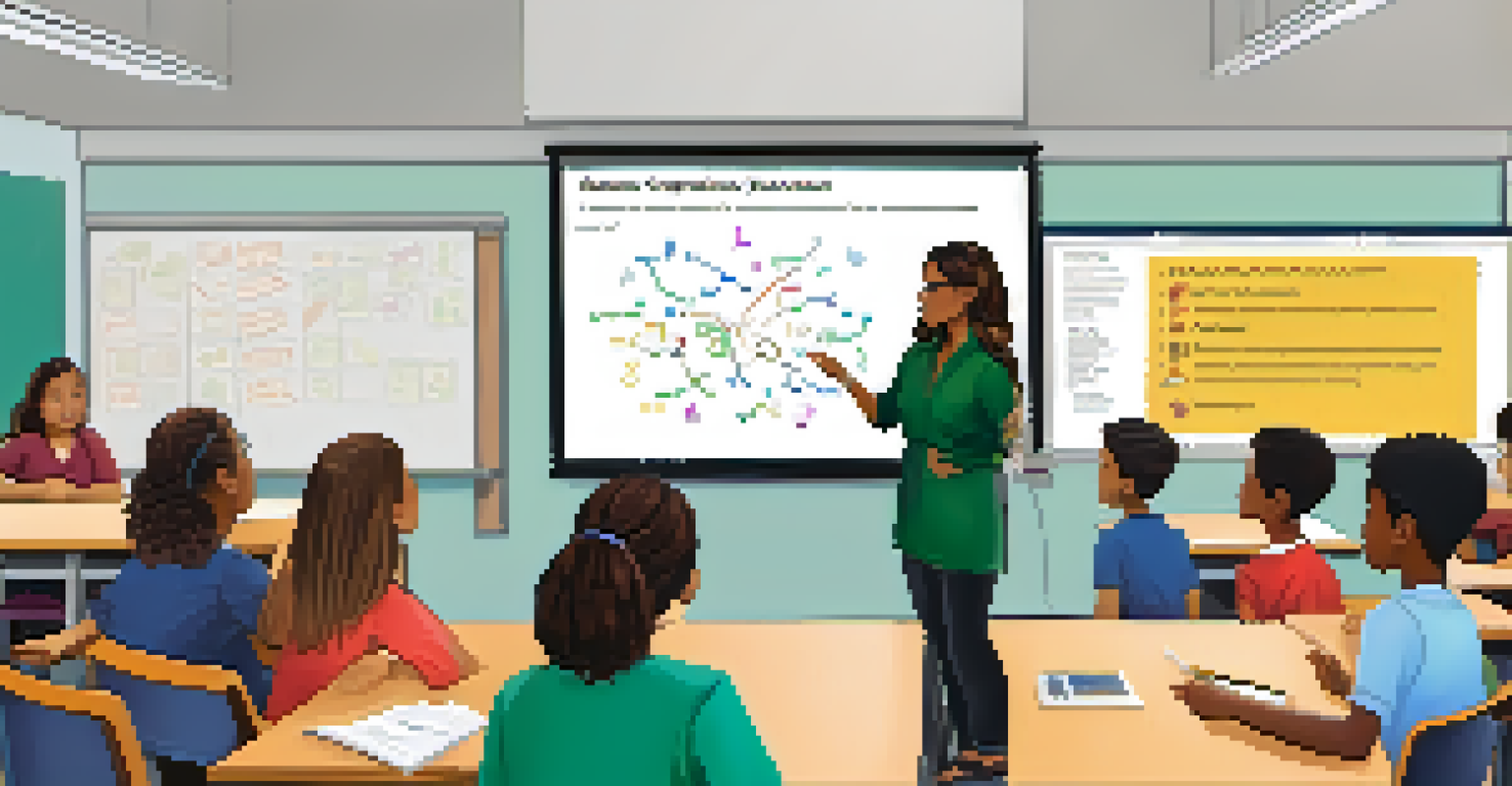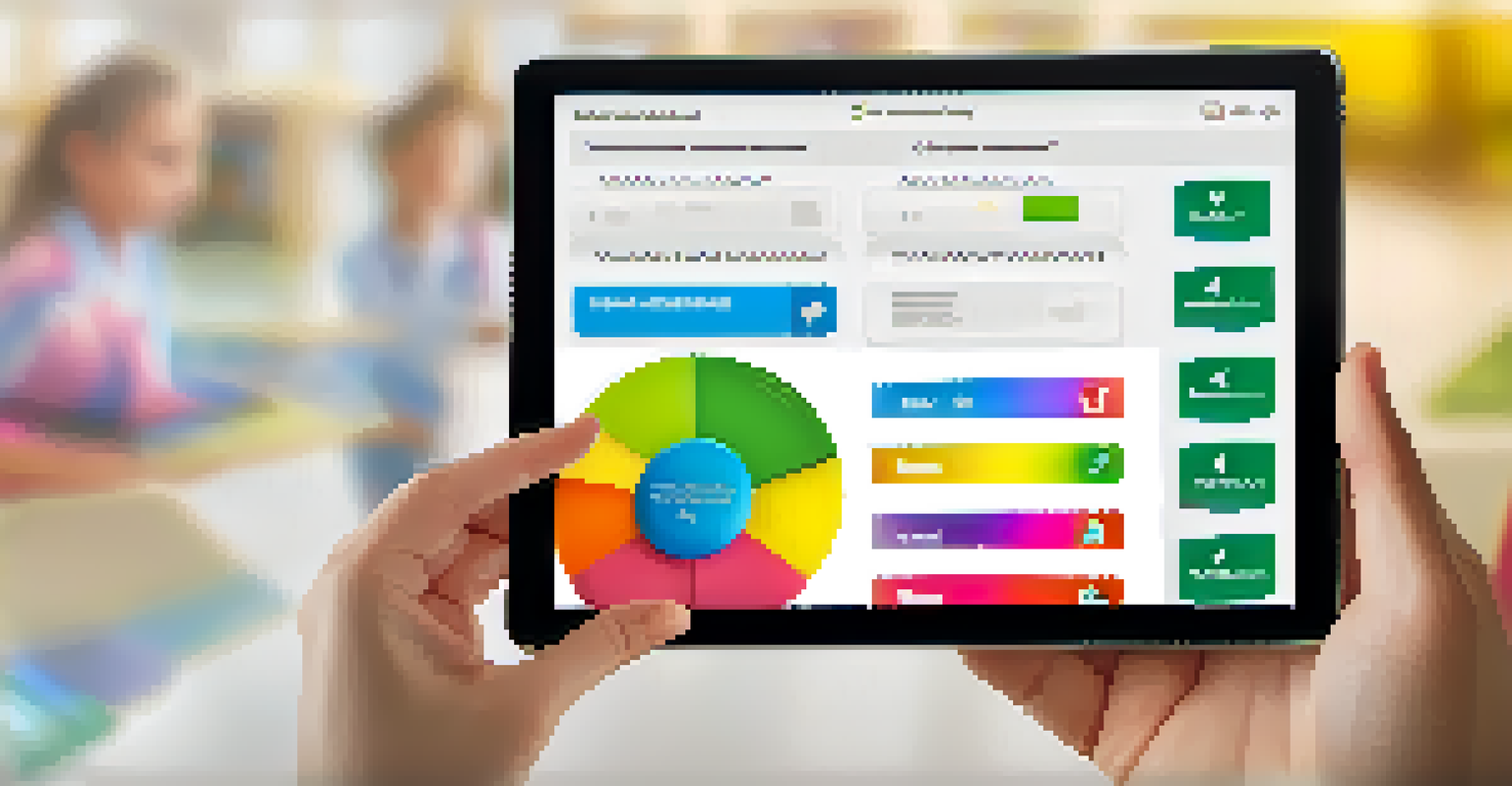Implementing Adaptive Assessments in Online Learning

Understanding Adaptive Assessments: A Brief Overview
Adaptive assessments are tailored testing methods that adjust to a learner's abilities. Unlike traditional assessments, they modify the difficulty of questions based on the student's performance. This dynamic approach not only gauges knowledge but also enhances engagement by providing a personalized experience.
The greatest sign of success for a teacher is to be able to say, 'The children are now working as if I did not exist.'
Imagine taking a test where each question is crafted just for you, adapting in real-time to ensure you're neither overwhelmed nor bored. This method is akin to having a personal tutor who knows exactly how to challenge you without pushing you too far. Such adaptability can lead to a deeper understanding of the subject matter.
As online learning continues to grow, integrating adaptive assessments can significantly improve the learning experience. They offer immediate feedback, allowing students to identify areas for improvement right away. This responsiveness fosters a growth mindset, encouraging learners to take ownership of their education.
The Benefits of Implementing Adaptive Assessments
One of the primary advantages of adaptive assessments is their ability to cater to diverse learning styles. Every student has unique strengths and challenges, and adaptive assessments recognize this diversity by adjusting accordingly. This personalization not only boosts confidence but also motivates students to engage more with the material.

Moreover, these assessments can lead to better retention of information. By presenting questions that align with a student's current knowledge level, learners are more likely to grasp concepts fully. Think of it as building a solid foundation before adding more complex structures on top; this method creates a more robust understanding.
Personalized Learning Experience
Adaptive assessments tailor questions to individual learners, enhancing engagement and understanding.
Additionally, adaptive assessments save time for both students and educators. Instead of spending hours on a one-size-fits-all exam, students can focus on areas that truly need improvement. This efficiency allows teachers to tailor their instruction more effectively, fostering a more productive learning environment.
Technological Tools for Adaptive Assessments
Implementing adaptive assessments requires the right technological tools. Various platforms are designed specifically for creating and administering these assessments, offering features like analytics and reporting. Tools such as AI-driven software can analyze student responses and adjust questions in real-time, creating a seamless experience.
Education is not the filling of a pail, but the lighting of a fire.
For example, platforms like Knewton or Smart Sparrow use data analytics to personalize learning paths for students. They track progress and adapt content based on individual performance, ensuring that each learner receives a custom-tailored educational journey. This technology not only enhances engagement but also empowers students to take control of their learning.
It's essential to choose a platform that aligns with your educational goals. A good tool should offer user-friendly interfaces for both learners and educators, making it easy to implement adaptive assessments without a steep learning curve. The right technology can make all the difference in successfully integrating adaptive assessments into your online learning strategy.
Designing Effective Adaptive Assessments
Creating adaptive assessments involves thoughtful design to ensure effectiveness. Start by defining clear learning objectives and outcomes for your assessments. This clarity will guide the development of questions that not only align with curricular goals but also adapt to different skill levels.
Next, consider incorporating a variety of question types—multiple-choice, short answer, or even interactive simulations. This diversity can cater to different learning styles, enhancing engagement and comprehension. Think of it as providing a buffet of options; different students will gravitate toward different foods based on their preferences.
Diverse Learning Styles Supported
These assessments cater to unique strengths and challenges, boosting student confidence and motivation.
Lastly, ensure that assessments are regularly updated based on student performance data. Continuous improvement is key, as this allows for the identification of patterns and areas that may need more focus. By refining assessments over time, educators can maintain relevance and effectiveness in their adaptive learning approaches.
Challenges in Implementing Adaptive Assessments
While adaptive assessments offer numerous benefits, there are challenges to consider. One significant hurdle is the initial investment in technology and training. Schools and educators may need to allocate resources for software, hardware, and staff training, which can be daunting for some institutions.
Moreover, there may be resistance from educators accustomed to traditional assessment methods. Change can be difficult, and some may question the reliability of adaptive assessments compared to standardized testing. It's crucial to communicate the benefits clearly and provide support during the transition to ease these concerns.
Finally, ensuring equitable access to technology for all students is a critical consideration. Not every learner may have access to the devices or internet connectivity needed for online assessments, creating potential disparities. Addressing this issue is vital to ensure that adaptive assessments serve as a tool for inclusion rather than exclusion.
Best Practices for Successful Implementation
To successfully implement adaptive assessments, it's important to start small and scale gradually. Begin with a pilot program, testing the waters with a single course or subject. This approach allows for adjustments based on immediate feedback and minimizes the risk of widespread issues during the rollout.
Involve educators in the design and implementation process. Their insights are invaluable and can help tailor the assessments to meet the specific needs of students. Collaboration ensures that the transition is smoother and that educators feel supported throughout the process.
Efficient Use of Educational Resources
Adaptive assessments save time for students and educators, allowing a focus on specific areas needing improvement.
Lastly, provide ongoing training and support for both students and educators. Regular workshops, tutorials, and resources can help everyone feel confident in using the new assessments. Remember, the goal is to create an environment where adaptive assessments enhance learning, not complicate it.
The Future of Adaptive Assessments in Online Learning
As online learning continues to evolve, the future of adaptive assessments looks promising. Innovations in artificial intelligence and data analytics will likely enhance the personalization of these assessments even further. We can expect to see more sophisticated algorithms that can adjust in real-time, providing a truly customized learning experience.
Additionally, as the demand for flexible and personalized education grows, adaptive assessments will become an integral part of online learning environments. They will not only help in assessing knowledge but also in identifying learning gaps and opportunities for growth. This evolution signifies a shift towards more learner-centered education.

Ultimately, the integration of adaptive assessments can revolutionize online learning by making it more responsive, engaging, and effective. By keeping the learner at the center of the process, we can ensure that education is not just a one-size-fits-all approach, but a tailored journey for every student.